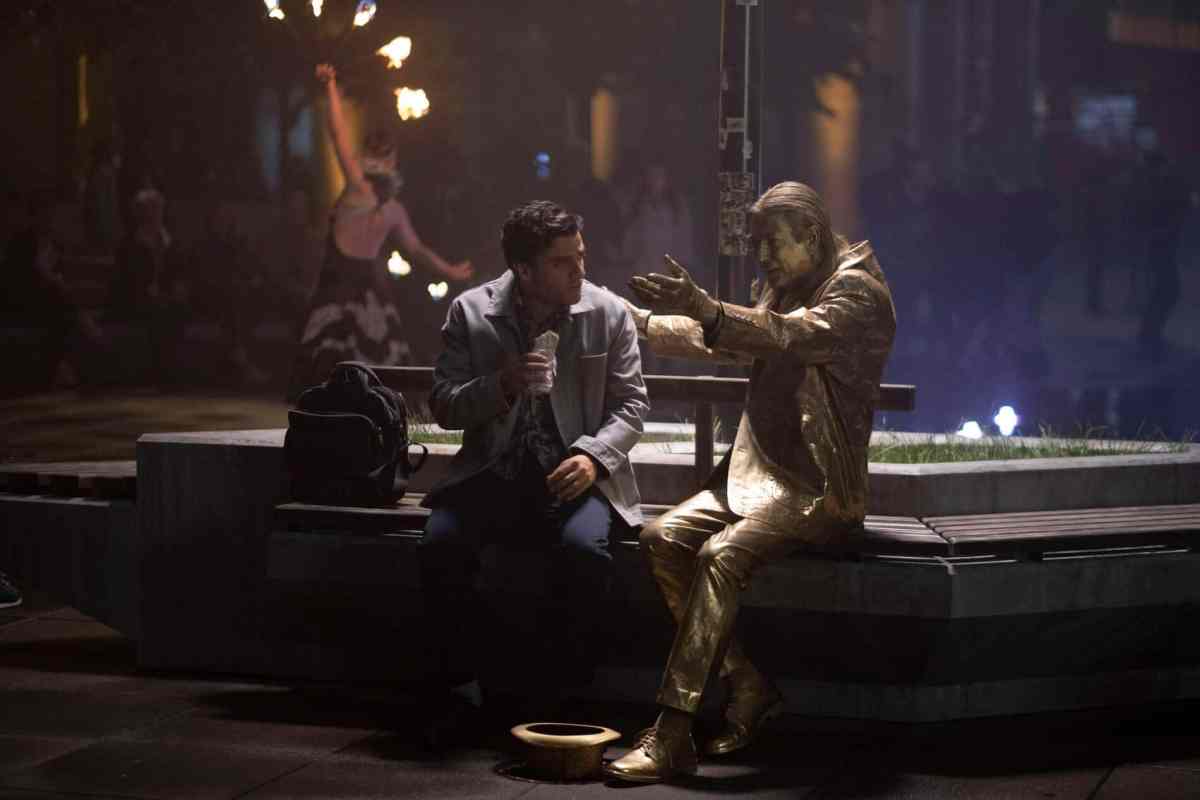This discussion and review contains some spoilers for Moon Knight episode 1, “The Goldfish Problem,” on Disney+.
There’s a notable tension at play within Moon Knight, but it is particularly obvious within “The Goldfish Problem.”
Moon Knight is the first of the Marvel streaming shows on Disney+ not to be based around an established character. Even What If…? riffed on familiar heroes and concepts. In contrast, the entirety of Moon Knight hinges on the arrival of a new character into the Marvel Cinematic Universe (MCU), rather than expanding the role of a previous supporting player. Outside of a brief reference in Captain America: The Winter Soldier, Steven Grant (Oscar Isaac) is a blank slate to audiences.
As such, it feels fitting that there is a push and pull obvious within “The Goldfish Problem.” There are quite a few elements that feel ambitious and experimental in the larger context of the staid and aesthetically conservative MCU. However, there is also a sense that those elements can only go so far before the rubber band snaps back into a familiar template, giving audiences exactly what they expect from a show like this. It suggests an identity crisis similar to the one facing protagonist Grant.
The central hook of “The Goldfish Problem” is a classic film and television premise. Steven Grant keeps losing time. He keeps waking up in places with no idea how he got there or what he is supposed to be doing. Without any surrounding context, Grant has to navigate these heightened and absurd situations. It’s an interesting hook for a character, and “The Goldfish Problem” uses it to great effect. It uses these blackouts to imply brutal off-screen violence and to rapidly escalate stakes.

This isn’t a radical concept. The classic television show Quantum Leap was built around this hook, each episode ending on a cliffhanger that found Dr. Samuel Beckett (Scott Bakula) thrown through time, landing in a new body in a new situation with little idea of what is happening around him. Christopher Nolan’s Memento also used a similar hook, moving backwards in time to disorient the audience as much as Leonard (Guy Pearce), who found himself in novel and unusual situations.
Still, it is perhaps the most formally ambitious aspect of any Marvel Studios production since the early episodes of WandaVision offered a whistlestop tour through the history of the American television sitcom. It’s a more distinct approach to storytelling than anything on The Falcon and the Winter Soldier, Loki, or Hawkeye. That is honestly commendable, particularly in the context of a shared universe that is starting to feel a little creatively stagnant.
There are other smaller touches suggesting a show more visually ambitious than much of the shared universe around it. There’s a recurring motif of glass and mirrors. Grant is haunted by reflective surfaces: the mirrors in the elevator and the bathroom, the glass in the security booth. It is hardly the most subtle of visual signifiers for a show about a character who is grappling with a fractured personality, but it is still an effective piece of visual storytelling.
It’s a motif that works in legitimately interesting ways. “The Goldfish Problem” opens with a sequence of Arthur Harrow (Ethan Hawke) shattering a glass object and wearing the shards in his shoes. Given the use of glass elsewhere as a window and a prism into Grant’s troubled psychological state, the breaking of a piece of glass and the use of its remnants as a constant source of pain is an effective point of connection and contrast between Grant and Harrow.

It’s also an introduction that feels more abstract than many villain reveals and introductions in these kinds of shows, particularly given the tendency to treat surprise villain reveals as an end unto themselves. The brief introduction of Harrow in “The Goldfish Problem” recalls the similar teasing of Kilgrave (David Tennant) in early episodes of Jessica Jones or Wilson Fisk (Vincent D’Onofrio) in Daredevil. It’s atmospheric and impressionistic, rather than literal or mechanical.
However, there are clear limitations in how far Moon Knight can stretch the Marvel Studios template, even in “The Goldfish Problem.” After all, this is a show about a Marvel superhero with dissociative identity disorder, who was introduced during the Bronze Age of comics, and who enjoyed a character-defining run under the pen of artist Bill Sienkiewicz. As such, Moon Knight isn’t competing with something like Hawkeye in terms of visual and narrative ambition. It is competing with Legion.
Noah Hawley’s Legion remains one of the most adventurous and absurdist superhero shows ever produced. There are any number of visuals from the show that seem to have taken their cues from Sienkiewicz’s distinctive and expressionistic art style. Legion was weird and surreal, in the way that the comics that inspired it could be weird and surreal. The comparisons do not flatter Moon Knight, illustrating the extent to which the show is constrained by the studio’s house style.
After all, Moon Knight has historically been one of the most experimental books published by Marvel Comics. The book has been continuously reinvented and reimagined over the years. Warren Ellis and Declan Shalvey reinvented the book as a collection of standalone noir detective one-shots. Jeff Lemire and Greg Smallwood reworked the book as a story of psychological breakdown and cosmic horror, with an entire subplot about making a Moon Knight movie for Marvel.

In contrast, while “The Goldfish Problem” includes smaller ambitious touches, it is very wary of potentially alienating any audience member. The first 20 minutes of the episode include three recognizable needle drops, the standard language of these sorts of shows: “Every Grain of Sand” by Bob Dylan, “A Man Without Love” by Engelbert Humperdinck, and “Wake Me Up Before You Go-Go” by Wham! They’re all populated with overt and on-the-nose lyrics to ease the audience through the imagery.
Similarly, Moon Knight suffers from an abundance of humor that undercuts the central tension of the premise. What is happening to Grant is horrific. There is something genuinely moving and affecting when Grant tells the waiter at the steak house, “The best part of the steak, that’s the bit that I want.” Grant is living half a life, missing the good parts. However, the show continuously punctures this by having all the characters turn into wry one-liner delivery mechanisms.
The voice inside Grant’s head is Khonsu, an Egyptian deity voiced by Academy Award-winning actor F. Murray Abraham. However, Khonsu doesn’t sound particularly godlike, snarkily referring to Grant as “the idiot” and calling him “stupid.” Similarly, Harrow is introduced as a mysterious and ominous figure, but the show insists on giving him humorous quirks as well, such as having him repeatedly refer to Grant as “Steven Grant of the Gift Shop,” in reference to his place of employment.

Similarly, for all that the show is more ambitious than many of its Marvel Studios contemporaries in terms of visual storytelling, it is also limited by the studio’s visual language. Late in the episode, Grant experiences a psychic break that includes plunging into darkness. However, Moon Knight feels curious and over-lit during these sequences, unable to conjure up the sense of dread and fear that a moment like this really needs. Naturally, “The Goldfish Problem” ends with a shot of Moon Knight in full costume.
Indeed, much like the opening episode of Loki was keen to reassure viewers that it was a Marvel Studios production by having Loki (Tom Hiddleston) watch Avengers: Infinity War, and much like Eternals asserted its brand bona fides by having characters constantly talk about Thanos (Josh Brolin), “The Goldfish Problem” is careful to continuously remind viewers that they are watching a Marvel Studios production. Harrow even gets a riff on Loki’s visit to Germany in The Avengers.
“The Goldfish Problem” marks a solid and functional start to Moon Knight, but one that remains trapped between offering viewers something new and delivering familiar comforts.






Published: Mar 30, 2022 11:00 am